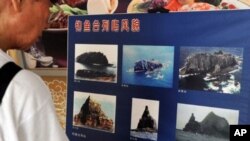President Barack Obama and Southeast Asian leaders meet in New York Friday, September 24, as relations between East Asia's two big powers - China and Japan - are increasingly strained. Territorial disputes with China over uninhabited islands in the western Pacific are expected to dominate the discussions.
South China Sea territorial claims
President Obama and leaders from the 10-member Association of Southeast Asian Nations are expected to call for a peaceful solution to the South China Sea territorial dispute.
The issue flared up earlier this year when China claimed the vital shipping lane as part of its core national interest. Last month, its navy planted a flag at the bottom of the South China Sea in a show of sovereignty.
But the Philippines, Vietnam, Brunei, Taiwan and Malaysia also have claims on the South China Sea, and the uninhabited Spratly Island chain within it. In 1988, Vietnam and China fought deadly clashes there.
The seabed around the islands is thought to be rich in resources such as oil and gas.
This week, Chinese Foreign Ministry spokeswoman Jiang Yu warned ASEAN and the U.S. against issuing a statement on the region.
Jiang says outside parties should not interfere with the dispute. She says the issue should not be internationalized because it will not solve the problem and would only make it complicated.
Multilateral approach
ASEAN has called for multilateral talks to settle South China Sea boundaries but Beijing rejects that idea.
In July, U.S. Secretary State Hillary Clinton told ASEAN foreign ministers that Washington has an interest in keeping the waters open to all.
Simon Tay, chairman of the Singapore Institute of International Affairs, says Washington must raise its engagement with ASEAN, but not to isolate China.
"Southeast Asians have shown they're quite concerned about what China is doing and how China will respond," said Tay. "The U.S.-ASEAN summit, if it is to be useful, will not be simply the U.S. trying to get ASEAN countries to get into the U.S. orbit again, wholly on their side, because Southeast Asian countries would be stupid to do that. But I think it will be a kind of strategic dialogue that can then triangulate with China and the rest of Asia."
Chinese boat captain detained
Friday's meeting comes as relations between China and Japan have deteriorated over a separate territorial dispute. Japan detained a Chinese boat captain earlier this month, after a collision between his boat and Japanese patrol boats near islands Beijing and Tokyo both claim.
Beijing cut off government exchanges with Tokyo and Premier Wen Jiabao says Beijing will take further measures against Japan if the captain is not immediately released.
Kitti Prasirtsuk, an associate dean of international relations at Thammasat University in Thailand, says the situation has implications for ASEAN.
"The issue between Japan and China is not different from what's happening in the South China Sea," said Kitti. "I think the Chinese stance would definitely affect ASEAN sentiments…. It would even heighten the importance of the talks about the South China Sea."
Kitti adds ASEAN would like U.S. involvement in the region but not to the extent that it jeopardizes ties with China, a top source of investments and trade.
"China-ASEAN trade will grow anyway because our [economic] interdependence has been increasing over the past decade or so. ASEAN has to play a delicate game to get the U.S. involved so as to check China a bit as well," said Kitti.
The meeting in New York on the sidelines of the United Nations' annual General Assembly will be the second between President Obama and ASEAN leaders.
Fighting terrorism
The talks also are expected to include security cooperation, especially in the fight against terrorism.
Patricio Abinales is a Philippine scholar and a fellow at the Woodrow Wilson Center in Washington. He expects more U.S. assistance to Thailand and the Philippines, focused on their southern regions, which have been wracked by Muslim insurgencies.
"The U.S. will continue to be concerned about the way al-Qaida [and] Jemaah Islamiyah operate in the region," he said. "They've also realized the Islamic-related tensions in Southeast Asia, with the exception of Indonesia, are very indigenous and homegrown and so the aim there is to try to keep it at a low level, negotiate with local Islamic movements and assist the governments of Thailand and the Philippines deal with more extremist groups."
The U.S. Agency on International Development started a five-year $30 million program in southern Thailand earlier this year, and has poured at least US$345 million into Mindanao in the Philippines since 2000.
Friday's meeting will be Mr. Obama's first meeting with Philippine President Benigno Aquino III, who took office in June.
However, Indonesian President Susilo Bambang Yudhoyono will be absent. President Obama's visit to Indonesia, another ally in the war on terrorism, has been postponed three times this year. Jakarta says the president has previous commitments and will send Vice President Boediono instead.
Obama to Meet With ASEAN Leaders as Territorial Tensions Flare




